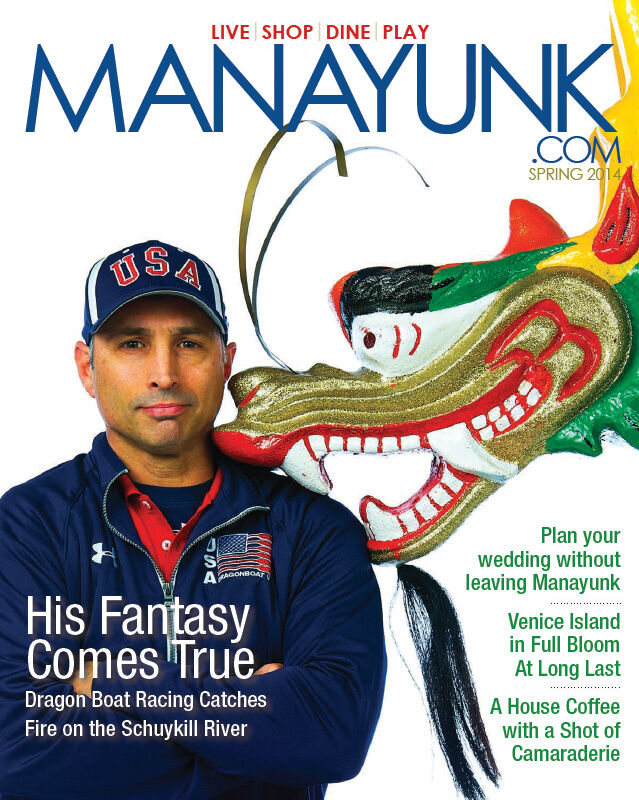COVER PROFILE: Captain of the Schuylkill

Originally Published In Manayunk.com Magazine
It was a series of abrupt turns—a severe neck injury that ended the ascension of a promising Drexel wrestler, an open call posted in a 7-11—that landed Mike Blundetto Sr. in an entirely unfamiliar place at the formative age of 19. And yet, instantly, the inside of a dragon boat—what would be the first to be manned by an all-American team—felt like it was exactly where he belonged.
Over the last three decades, if Blundetto wasn’t in one paddling along the Schuylkill or racing in a regatta somewhere around the world, he was encouraging growing legions of the curious and thrill seekers to pick up a paddle. The tipping point finally came in 2008, when USA Canoe/Kayak, the national governing body for paddle sports, invited Blundetto, who resides in Glen Mills, to launch a dragon boat arm. All of that patient, passionate nurturing came rushing to fruition as his national dragon boat teams went on to collect the most world medals of any of the USA Canoe/Kayak disciplines over the next five years.
But Blundetto, of course, was making waves long before he earned his weight in gold. Riding the swell of interest that followed the 2001 dragon boat world championships in Philadelphia, he formed, in 2004, the Manayunk Dragon Boat Racing Team, an amateur squad that’s proven to be fertile ground for the national team.
The Venice Island dock from which both train should be teeming this summer, as Blundetto aims his national racers, including himself, at the next ICF Dragon Boat World Championships in Poland in August. It’ll be hard to top the last installment, in 2012. Blundetto is a world champion several times over. But it was then, standing atop the medals podium in Milan, waiting for bronze medals to be hanged from his neck and his nine teammates’, that he realized that this trumped everything else. Because among his teammates were his oldest son, Mike Jr., and his three oldest daughters, Ashley, Brittany and Melina. Closing in on 50, they are what drive him now.
Facing a spring loaded with potential—national team trials all over the country and the start of his fourth decade of racing— Blundetto considers how far his sport’s come and what shapes its mainstreaming could take from here.
What did the early days of dragon boat racing look like around here?
It was nonexistent. The Hong Kong Tourist Association shipped a boat over to the folks on Boathouse Row to introduce them to the sport. There was no place to go, no place to compete. We just kind of did it and tried to figure it out as we went along.
How would you describe its state now?
I think it’s growing in popularity with recreational athletes, which is great. And I mean that in a positive way. Every sport has to have its base. It’s a really big deal, too, that people with physical handicaps are getting into these boats for therapy. The boats are pretty stable. So you can get people who have relatively little experience into them, teach them the concept of teamwork, and they can have a wonderful experience right out of the gate.
The weekend warrior may be your best-represented demographic, but there seems to be a concerted effort by Dragon Boat USA to identify potential racers at earlier ages.
We had a five-year game plan to get us to this point. Our future’s in the hands of youngsters that have not necessarily been introduced to this sport yet. We do stuff with North Light [Community Center] where we put the kids in boats. They have an opportunity to see what it’s like, see the city from the river. It’s a whole different perspective.
How intense is the run up to a race like the world championships?
Very. What I want to do first and foremost is teach them what it is that we’re expecting on race day, take them through a couple race-day scenarios. Once we teach them what works and what doesn’t work, and give them the best tools to be as successful as possible, we’ll then put that paddle back in their hands for a formal assessment. That’s how we select our team.
It sounds like there’s a lot of projection when it comes to scouting talent.
Absolutely. You gotta be an athlete. If your hand-eye coordination is there, and you’re in sync with everybody else, you’re going to be pretty powerful in this.
Out of my own stupid curiosity, the drum, is that purely for aesthetics or does it have an actual purpose?
It’s there to keep the roots of the sport. We’re more tuned into watching, feeling the people around us and listening to the commands than we are to listening to the drum. Though she’s got to physically drum, we don’t train to home in on the drum.
For more, visit www.dragonboatusa.com.
Recent Posts
-
As the chill of winter fades and the sun starts shining a little brighter, Manayunk transforms into a lively hub of food, fun, and fashion. Spring is the perfect time to explore this charming Philadelphia neighborhood, whether you're indulging in seasonal bites, enjoying alfresco dining, or shopping for unique finds at local boutiques. Here’s your ultimate guide to experiencing the best of Manayunk this spring!Apr 02, 2025
-
Manayunk's woman-owned businesses have teamed up as "The Manayunk Wingwomen" for the 4th Annual Manayunk Wingwomen Initiative!Mar 04, 2025
-
Celebrate Black History Month and Support Black-Owned Businesses in ManayunkFeb 14, 2025
-
Whether it's the love for your city and the bids, your significant others, or your pals - Main street is ready for your Friday celebration!Feb 12, 2025




Comments0